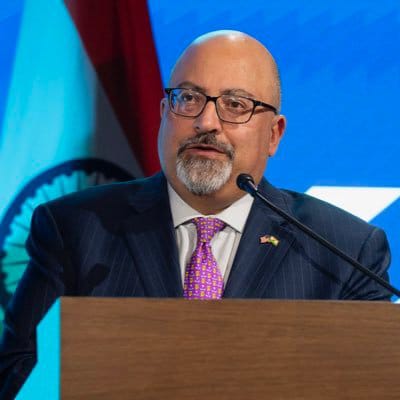As tensions mount between Washington and New Delhi over newly imposed U.S. tariffs, the US-India Business Council (USIBC) has called for renewed collaboration between the two nations. In a public statement issued on August 7, 2025, the Council emphasized that now is the time to “redouble our efforts, not pull apart,” even as US-India Trade Relations penalties threaten to disrupt bilateral relations.
Trump Imposes Additional 25% Tariff on Indian Imports
The growing US-India Trade Relations row escalated after U.S. President Donald Trump signed an executive order on August 6, slapping an additional 25% tariff on imports from India. This comes just days after an earlier 25% tariff hike approved on July 31, bringing the total tariff increase to 50% on Indian imports.
According to the Trump administration, the new measures are a direct response to India’s continued oil US-India Trade Relations with Russia, which the U.S. claims violates its sanctions regime and undermines its global energy policy efforts. The move has stirred concern in diplomatic and economic circles on both sides.
USIBC President Atul Keshap Calls for Continued Engagement
Ambassador (Ret.) Atul Keshap, President of the USIBC and a key voice in U.S.-India commercial relations, expressed concern over the escalating tensions but offered a constructive and future-focused message. In his official statement, he acknowledged the progress both nations have made over the past decade and emphasized the importance of mutual cooperation over confrontation.
“The partnership the United States and India have forged in recent years has brought significant mutual benefits, and our elected leaders should be proud of all they’ve accomplished,” Keshap stated.
He continued:
“The business community sees our shared strategic interests and complementary economies as powerful arguments to continue on this path. Business stands ready to help.”
Business Community Stands in Support of Stronger Bilateral Ties
The USIBC, which represents major American and Indian companies, has consistently advocated for policies that enhance the commercial corridor between the two democracies. The Council’s latest statement reflects growing unease within the business community about the rising protectionist tone in Washington, which could undermine investment flows, job creation, and US-India Trade Relations synergies.
Many analysts warn that prolonged friction could:
- Disrupt supply chains
- Impact Indian exporters — especially in pharmaceuticals, textiles, and IT services
- Deter strategic collaboration in sectors like defense, semiconductors, and clean energy
Strategic Interests at Risk as Tariffs Take Center Stage
Beyond economic considerations, the tariff dispute also risks affecting strategic alignments between the U.S. and India. Both nations have taken strides in recent years to enhance cooperation on:
- Global security
- Indo-Pacific stability
- Technology sharing
This makes them natural partners in the shifting geopolitical landscape.
Observers worry that this tariff standoff could derail progress made under frameworks like:
- QUAD
- IPEF (Indo-Pacific Economic Framework)
— particularly if retaliatory measures come into play.
India’s Response Remains Measured—For Now
So far, New Delhi has maintained a measured response. While India has defended its right to an independent foreign policy, including its decision to purchase discounted Russian crude, it has avoided escalating the rhetoric.
However, pressure is mounting on the Indian government to:
- Seek WTO consultation
- Impose reciprocal duties
- Diversify export markets to minimize reliance on the U.S.
Path Forward: Will Diplomacy Prevail?
With high stakes on both sides, trade and foreign policy experts believe that dialogue and diplomacy remain the best path forward. The USIBC’s appeal for continued engagement underscores the private sector’s willingness to play a bridging role in navigating this complex terrain.
Whether the two governments will recalibrate their approach in the coming weeks remains to be seen. The next round of trade talks, if confirmed, could provide an opportunity to:
- De-escalate tensions
- Clarify energy-related concerns
- Protect the hard-won gains in bilateral relations
A Crucial Moment for US-India Economic Ties
The US-India Business Council’s message is clear: despite the immediate challenges posed by tariffs and shifting geopolitics, the broader relationship between the world’s two largest democracies is too important to let unravel.
With both economies increasingly interlinked, now is the time to:
- Reinforce trust
- Support open markets
- Double down on shared goals
As Ambassador Keshap aptly put it:
“Business stands ready to help.”
The question now is whether political will can match this readiness—and whether diplomacy can chart a path beyond the tariffs.









